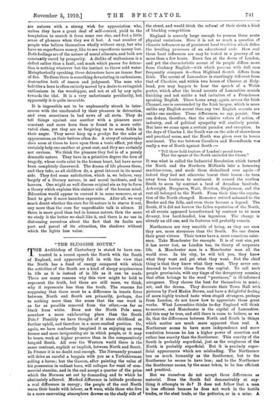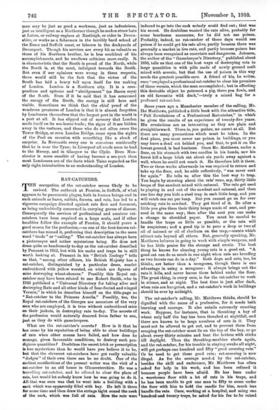"THE SLUGGISH SOUTH."
THE Archbishop of Canterbury is stated to have con- trasted in a recent speech the North with the South of England, and apparently fell in with the view that the North has a fund of energy compared with which the activities of the South are a kind of sleepy acquiescence in life as it is instead of in life as it can be made. There are many reasons why this view might be held to represent the truth, but there are still more, we think, why it represents less than the truth. The reasons for supposing that there must be a difference in innate force between North and South are primarily, perhaps, due to nothing more than the sense that the one word is as far as possible removed from the other,—as far as black from white. Does not the North Pole seem somehow a more exhilarating place than the South Pole ? Possibly we have thought of it since childhood as further uphill, and therefore in a more exalted position. Or, again, we have confusedly imagined it as enjoying an even keener and more invigorating air in which people, or it may be bears, work at higher pressure than in the comparatively languid South. All over the Western world there is the same contrast, explicit or implicit, between North and South. In France it is no doubt real enough. The Normandy peasant will drive as careful a bargain with you as a Yorkshireman selling a horse; but the Gascon, after painting the value of his possession in radiant hues, will collapse for want of com- mercial stamina, and in the end accept a quarter of the price which the Norman set out by demanding and to which he obstinately adhered. Marked difference in latitude produces a real difference in energy ; the people of the cool North warm their hands with labour, as ft were, while those who live in a more enervating atmosphere drowse on the shady side of
the street, and would think the refusal of their siesta a kind of blackleg competition.
England is scarcely large enough to possess these acute physical variations. Here it is not so much a question of climatic influences as of persistent local tradition which defies the levelling processes of an educational code. How real these local influences are may be tested in a journey of no more than a few hours. Essex lies at the doors of London, and yet the characteristic accent of its people differs more from Cockney English—with which persons with dull ears frequently compare it—than Highland Scotch differs from Irish. The accent of Lancashire is startlingly different from that of Cheshire, and within two hours of Chester, at Holy- head, you may happen to hear the speech of a Welsh porter, which after the broad accents of Lancashire sounds finicking and not unlike a bad imitation of a Frenchman speaking English. Three hours away, again, across the Irish Channel, one is surrounded by the Irish brogue, which is more unlike any English accent than any two English accents are unlike one another. These differences, we say, persist. One can deduce, therefore, that the relative values of action, of industry, and of political sympathy will similarly persist. But here we come upon a certain paradox and exception. In the days of Charles I. the South was on the side of shrewdness and practical sense, and the North was given over to heroic sentiment. The war between Cavaliers and Roundheads was really a war of North against South :— "Tell those bold traitors of London's proud town That the spears of the North encircled the Crown."
It was what is called the Industrial Revolution which turned the North and the Northern Midlands into a humming machine-room, and made them disinclined ever again—if indeed they had not otherwise learnt their lesson—to turn away from business to sentiment. It caused the coalless South to seem by contrast a land of Arcadian lassitude. .A.rkwright, Hargraves, Watt, Boulton, Stephenson, and the rest all belonged to the North. From their time the reputa- tion of the North changed. Romance retired ashamed to the Border and the fells, and even there became a legend. The South, if it did not borrow the fallen reputation of the North, at all events appeared henceforward by contrast to be more dreamy, less hard-headed, less ingenious. The change is already an old one, and its features will probably remain.
Northerners are very sensible of being, as they are sure they are, more strenuous than the South. No one denies their great virtues. Their towns have a more conscious exist- ence. Take Manchester for example. It is of vast size, yet it has never lost, as London has, its theory of corporate life. A. Manchester man is a Manchester man all the world over. In his city, he will tell you, they know what they want and get what they want. But the chief thing is that they know what they want. They never con- descend to borrow ideas from the capital. To call such people provincials, with any tinge of the derogatory meaning that often belongs to the word "provinces," is ill-informed arrogance. They choose the best for themselves in music, art, and the drama. They decorate their Town Hall with pictures by Ford Madox Brown, and have a delightful feeling of more highly trained taste when stupid strangers, perhaps from London, do not know how to appreciate these great works. What Lancashire thinks to-day England will think to-morrow, and Manchester is the capital of Lancashire. All this may be true, and still there is room to believe, as we do, that the differences between North and South in things which matter are much more apparent than reaL Northerner seems to have more independence and more resolution because he has a higher power of assertion and rather leas suavity than the Southerner. This suavity of the South is probably superficial, just as the roughness of the North is probably superficiaL But it is precisely super- ficial appearances which are misleading. The Northerner has as much humanity as the Southerner, but to the Southerner he seems to have less ; and to the Northerner the Southerner seems, by the same token, to be less efficient and practical.
But we ourselves do not accept these differences as material. Does the South fail demonstrably at any- thing it attempts to do P It does not follow that a man is less efficient became he does not work in the textile trades, or the steel trade, or the potteries, or in a mine. A man may be just as good a workman, just as industrious, just as intelligent as a Northerner though he makes straw hats at Luton, or railway engines at Eastleigh, or cider in Devon- shire, or works as a fisherman in the terribly hard school of the Essex and Suffolk coast, or labours in the dockyards of Devonport. Though his services are every hit as valuable as those of his Northern brother, be is less confident of his accomplishments, and he swallows criticism more easily. It is characteristic that the South is proud of the North, while the North is, at the most, indulgent towards the South. But even if our opinions were wrong in these respects, there would still be the fact that the virtue of the South has laid a heavy toll upon itself for the making of London. London is a Southern city. It is a com- pendium and epitome and "abridgement" (as Bacon says) of the South. Even if it be said that it has consumed the energy of the South, the energy is still here and visible. Sometimes we think that the chief proof of the wondrous greatness of London is that it is almost forgotten by Londoners themselves that the largest port in the world is a port at all. It has slipped out of memory that London made itself on its sea-borne trade; the signs of it are hidden away in the vastness, and those who do not often cross the Tower Bridge, or even London Bridge, come upon the sights of the Pool on occasion with something like a shock of surprise. In Newcastle every one is conscious continually that he is near the Tyne; in Liverpool all roads seem to lead to the Mersey, and in Glasgow to the Clyde. Even Man- chester is more sensible of having become a sea-port than most Londoners are of the facts which Taine regarded as the only right introduction to an understanding of London.



































































 Previous page
Previous page